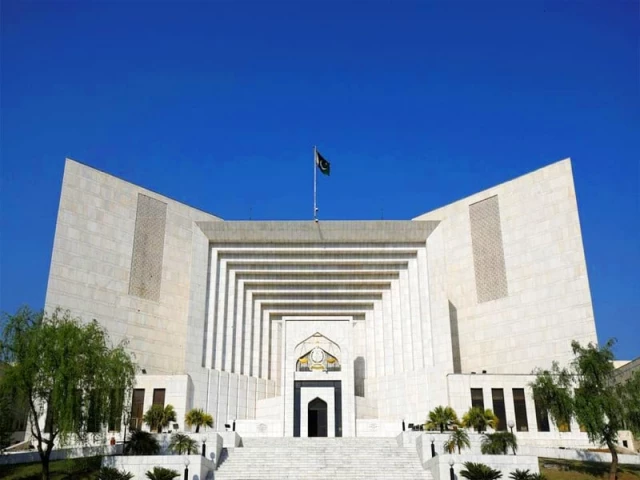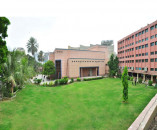Adjournment sought for reserved seats case until 26th amendment verdict
SIC also demands live telecast, reconstitution of review bench with original judges.

The Sunni Ittehad Council (SIC) has requested the Supreme Court to adjourn proceedings in the reserved seats case until a decision is reached on challenges to the 26th Constitutional Amendment.
The SIC and its chairman, Sahibzada Hamid Raza, have filed three applications before the apex court, seeking a live telecast of the court proceedings and a reconstitution of the current review bench, proposing it be replaced with the original 12-judge bench that ruled on July 12, 2024, in favour of PTI’s claim to all reserved seats.
An 11-member constitutional bench is scheduled to resume hearings of the review petitions on Monday.
One of the applications notes that a large number of petitions challenging the 26th Amendment are currently pending before the SC.
“The newly added Article 191A(5) provides that all petitions, appeals, or review applications against judgments rendered or orders passed, to which clause (3) applies, pending or filed in the Supreme Court prior to the commencement of the Constitution (Twenty-Sixth Amendment) Act, 2024, forthwith stand transferred to the Constitution Bench and shall only be heard and decided by benches constituted under clause (4).”
The application argues that there is a stark and well-settled difference between an appeal and a review jurisdiction, since a review petition or application is heard by the same bench that passed the judgment.
“An appeal is a continuation of the original proceedings, while review jurisdiction is governed by Article 188 of the Constitution read with the Supreme Court Rules, 1980. It is submitted that Rule 8 of Order XXVI of the Supreme Court Rules, 1980 provides that, as far as practicable, a review application shall be posted before the same bench which delivered the judgment.”
It is contended that, since Article 188 expressly provides that such jurisdiction is to be exercised in accordance with the Rules—which require that a review petition be heard by the same bench that delivered the judgment—and that being the original provision as passed by the constituent assembly, there is a patent conflict with Article 191A(5).
The latter, having been passed by the Majlis-e-Shoora (Parliament), is argued to lack both legitimacy and moral authority.
Therefore, the latter provision, to the extent that it places review applications before the constitutional bench, is void and ultra vires the Constitution.
“Even otherwise, the amending power under Article 239 of the Constitution is to be exercised as a sacred trust, as ordained by the preamble to the Constitution. The aforesaid Article 191A(5), added through the 26th Amendment—including the provision relating to the hearing of review applications by the Constitutional Bench and given retrospective effect—was, with utmost respect, a fraud upon the electorate. The said provision was added specifically to undo judgments given by the Supreme Court that were disfavoured by the present government, which cobbled together a majority to pass the amendment in order to perpetuate its rule without a mandate from the electorate.”
The petition further argues that the right to a fair trial has been specifically raised in the petition challenging the vires of the 26th Amendment.
It is further submitted that Article 191A(5), insofar as it transfers review jurisdiction to the Constitutional Bench, is in conflict with Article 10A of the Constitution and thus void.
“Article 191A(5) of the Constitution, whereby the difference between an appeal and a review application has been ended and the jurisdiction of the bench that passed the judgment has been taken away to undo the said judgment dated July 12, 2024, is patently against the independence of the judiciary and the rule of law.”
The application also states that the Judicial Commission of Pakistan, which constitutes the constitutional bench, is virtually under the control of the executive and can thereby influence the exercise of the SC's jurisdiction.
It notes that the senior-most judges of the top court have not been included in constitutional benches formed in recent months, compromising judicial independence.
It is further noted that all petitions against the 26th Constitutional Amendment were already admitted on January 17. Therefore, the applicant has requested that the reserved seats case be adjourned until a decision is rendered in those petitions.
To ensure transparency in the proceedings, the application has also prayed for the proceedings to be telecast live and made publicly accessible.
The application asserts that it is “absolutely unconstitutional, illegal, contrary to the rules and repugnant to established practice and precedent” that the author judge of the opinion of the court has been excluded from the review bench.
“The history of the case, its late fixation, the illegal and improper formation of the review bench, hurried hearings, exclusion of judges dissenting against the issuance of notice on the review petitions—all lead to the unavoidable conclusion that there is something strange in the entire episode. All this appears to be part of a sinister plan to set aside what is a historic judgment of this Hon’ble Court based on substantial justice.”
The application warns that if the current bench insists on hearing the review petitions, the entire exercise—both in terms of hearing and judgment—will become an “embarrassing event in the judicial history of Pakistan,” which will haunt the judiciary and the court for years or even decades.
“In any case, the judges who did not hear the original case resulting in the impugned judgment dated July 12, 2024, stand disqualified to hear this objection petition because, otherwise, they would be judges in their own cause. In other words, they cannot decide if they should be part of the review bench or not.”
“It is therefore prayed that the review bench presently constituted be reconstituted by including the 12 learned judges who were members of the original bench of the Supreme Court that gave the impugned judgment dated July 12, 2024,” the application states.




















COMMENTS (1)
Comments are moderated and generally will be posted if they are on-topic and not abusive.
For more information, please see our Comments FAQ